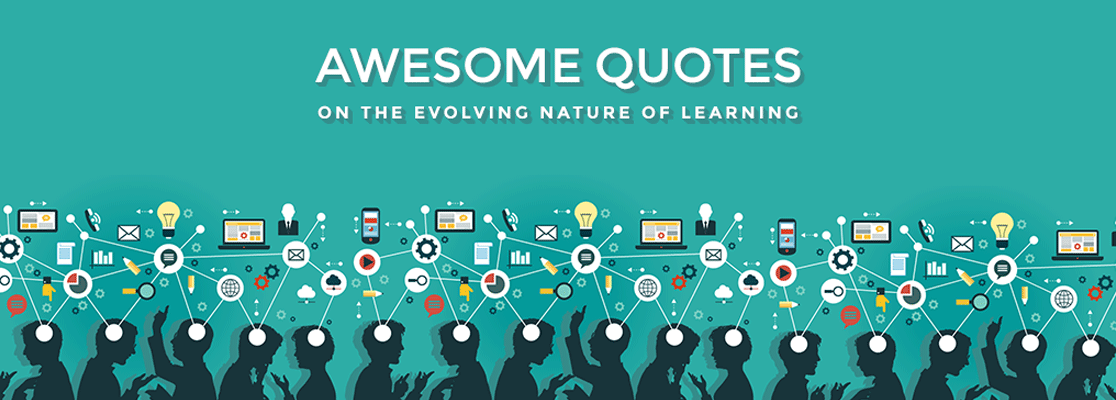QUOTE
“I heard a great story recently… of a little girl who was in a drawing lesson. She was six and she was at the back, drawing, and the teacher said this little girl hardly ever paid attention, and in this drawing lesson she did. The teacher was fascinated and she went over to her and she said, ‘What are you drawing?’ And the girl said, ‘I’m drawing a picture of God.’ And the teacher said, ‘But nobody knows what God looks like.’ And the girl said, ‘They will in a minute.‘” — Sir Ken Robinson
INTRODUCTION
We are fortunate to be living in this most exciting time in history, where we are seeing the evolution not just of learning as a concept, but also of learners and their preferences.
Learning is changing dynamically in our schools, colleges and universities. One topic of discussion that has become popular in recent times amongst all stakeholders is the re-imagining of an education scenario where creativity and innovation hold center stage. We couldn’t agree more with Haruki Murakami that “The most important thing we learn at school is the fact that the most important things can’t be learned at school.” This statement will hold true until schools start teaching “how” to learn, thereby equipping children to take care of their own continuous (life-long) learning. In this regard, it is inspiring to see many models (such as SOLE from Sugata Mitra) coming up, which call for a new way of thinking about learning and education. New learners are self-directed, and are capable of organizing, driving and managing their own learning using the Internet. We are in agreement with Sugata Mitra about not just allowing access to information (via the Internet) during examinations, but also to base the testing process around this principle.
These thoughts and inspirations on the evolving nature of learning are regularly echoed by learning leaders around the world. Here are some of the most inspiring thoughts we wish to share:
- “I’m “very sad” about the dominant education system in most parts of world: It is based on giving young people a career to go out and make money. Schools are building a labour force for big industry to exploit and expand. That is not education. Education is where people learn about themselves, their character and their connection with each other. That part doesn’t happen at all, there is no emphasis on that.” — Arun Gandhi (Grandson of Mahatma Gandhi)
- “I didn’t see the regular schools doing the things I thought should be done.” — Elon Musk (who built an alternative “un-school” without grades for his children)
- “Knowing is NOT the most important thing. To be able to FIND OUT is more important than knowing.” — Sugata Mitra
- “We know how kids learn; we know what classes should look like, and yet our classes look almost the opposite.” ― Adam Holman
- “Education is doing exactly what it was designed for…it’s doing great things for an economic model that doesn’t exist anymore.” ― Jaime Casap
- “We have to personalize education, not standardize it.” ― Sir Ken Robinson
- “If we teach today’s students as we taught yesterday’s, we rob them of tomorrow.” ― John Dewey
- “We have failed for over 7000 years to find the answer to the issue of how to educate everybody.” ― Sugata Mitra
- “What if I were to say that arithmetic as we teach it today is an obsolete skill? The whole world will erupt if I say that. Because, they’ll say “reading, writing, and arithmetic…that’s the core of education.” Core of who’s education? Core of the military education.” ― Sugata Mitra
- “It is often said that education and training are the keys to the future. They are, but a key can be turned in two directions. Turn it one way and you lock resources away, even from those they belong to. Turn it the other way and you release resources and give people back to themselves. To realize our true creative potential—in our organizations, in our schools and in our communities—we need to think differently about ourselves and to act differently towards each other. We must learn to be creative.” — Sir Ken Robinson
- “Learning and teaching are not symmetrical. They are not the flip sides of the same coin, in spite of the fact that almost all papers and conversations on education assume they are.” ― Sugata Mitra
- “The challenge is not to repair the education system but change it: not reform but transform it.” ― Sir Ken Robinson
- “The principle goal of education in the schools should be creating men and women who are capable of doing new things, not simply repeating what other generations have done; men and women who are creative, inventive and discoverers, who can be critical and verify, and not accept, everything they are offered.” ― Jean Piaget
- “The internal combustion engines removed the profession of coachmen, and made passengers the drivers, and then today, cars that drive themselves…There will be a generation one day that asks their grandfathers, “what does driving mean”, and a generation that asks (perhaps) “what does knowing mean.” ― Sugata Mitra
- “One Size Does Not Fit All. Some of the most brilliant, creative people I know did not do well at school. Many of them didn’t really discover what they could do—and who they really were—until they’d left school and recovered from their education.” ― Sir Ken Robinson
- “Generally in life, knowledge is acquired to be used. But school learning more often fits Freire’s apt metaphor: knowledge is treated like money, to be put away in a bank for the future.” ― Seymour Papert
- “Too many feel that what they’re good at isn’t valued by schools. Too many think they’re not good at anything.” ― Sir Ken Robinson
- “Every maker of video games knows something that the makers of curriculum don’t seem to understand. You’ll never see a video game being advertised as being easy. Kids who do not like school will tell you it’s not because it’s too hard. It’s because it’s boring.” ― Seymour Papert
- “Each time one prematurely teaches a child something he could have discovered himself, that child is kept from inventing it and consequently from understanding it completely.” ― Jean Piaget
- “The most important outcome of education is to help students become independent of formal education.” — Paul E. Gray
- “A long time ago, there was no such thing as school, and children spent their days learning a trade, a phrase which here means “standing around doing tedious tasks under the instruction of a bossy adult.” In time, however, people realized that the children could be allowed to sit, and the first school was invented.” ― Lemony Snicket
- “When my son, James, was doing homework for school, he would have five or six windows open on his computer. Instant Messenger was flashing continuously, his cell phone was constantly ringing, and he was downloading music and watching the TV over his shoulder. I don’t know if he was doing any homework, but he was running an empire as far as I could see, so I didn’t really care.” ― Sir Ken Robinson
- “Everyone is born with some propensity for entrepreneurship, which at its core is about solving problems creatively…Unfortunately, the current education system doesn’t support the development of an entrepreneurial mindset because of its reliance on standards, tests and a prescribed curriculum, which are all fundamentally incompatible with entrepreneurial thinking.” ― Yong Zhao
- “…we are educating people out of their creative capacities. Picasso once said this, he said that all children are born artists. The problem is to remain an artist as we grow up. I believe this passionately, that we don’t grow into creativity, we grow out of it. Or rather, we get educated out if it. So why is this?” ― Sir Ken Robinson
- “Education would be much more effective if its purpose was to ensure that by the time they leave school every boy and girl should know how much they do not know, and be imbued with a lifelong desire to know it.” ― Sir William Haley
- “In a classical joke, a child stays behind after school to ask a personal question. “Teacher, what did I learn today?” The surprised teacher asks, “Why do you ask that?” and the child replies, “Daddy always asks me and I never know what to say.” ― Seymour Papert
- “Schools, as we know them now, are the product of an age that has ended. They are out-dated and obsolete.” ― Sugata Mitra
- “Creativity in the workplace starts with creativity in education.” — Adobe
- “Traditional learning environments were built to support a world that no longer exists. What we need now is Self-Organized Learning Environments (SOLEs).” – Sugata Mitra
Learning is changing more dynamically than ever before at today’s workplaces as well, and as a result, there is a fundamental shift in how organizations perceive workplace learning. Employees are eager to manage their own learning than spending time with structured learning programs. Many studies prove again and again that workers learn the most from on-the-job experiences (informal), a little lesser from peer interactions (social), and the least from structured (formal) training programs. The demand is for quick and short learning and performance support interventions that are made available (automatically!) to these learners through their own devices at their exact point-of-need. Gone are the days of “knowledge mastery” (carrying knowledge with you for later use). The renewed focus of the day is on “continuous learning” (learning continuously and knowing how to access required information when in need). What we see around us today are:
- Introduction of new forms, methods and techniques
- Re-emergence of old forms, methods and techniques
- Acceptance to continuous learning
Organizations that have realized and accepted this have already started re-thinking and re-aligning their views in line with these shifts around organizational learning. As a consequence, the role of learning professionals has morphed from being mere providers of instructional support to facilitators who help workers manage their own learning. This, clubbed with the need for creative thinking to solve our business problems of today, is making us re-think the role of learning at workplaces.
We remain continuously inspired by thoughts from today’s learning leaders on the evolving nature of learning and performance development in the workplace. Here are some inspiring insights from these experts:
FROM EXPERTS
- “One of the principles of the future employee will be the shift from being a “knowledge worker” to being a “learning worker”.” – Jacob Morgan
- “There will be a number of individuals who will need help to become independent learners…L&D clearly has a important role to play here – not as an instructor or instructional designer, but as a Personal Learning Advisor.” — Jane Hart
- “We have come to a point where organizations can no longer leave learning to their HR or training departments.” – Harold Jarche
- “Forget about the traditional way you’ve trained people. Unlearn your assumptions about courses and top-down learning. Break with the present by looking ahead five years. Start with a blank piece of paper.” – Jay Cross
- “I wake up every morning looking forward to what I am going to learn that day. If you are excited about what lies ahead, you are far more likely to make new discoveries.” – Richard Branson
- “The key to making more inflexible, conditioned adults loosen up and try things in a new way is to make them feel safe, curtail the instinct to compete and, perhaps most important, let them know that their efforts to change have value.” – Sugata Mitra
- “Talent acquisition and digital entrepreneurship are becoming more and more competitive and failure to recognize that the conversations are changing can lead an organization to follow in the footsteps of Kodak.” – Ken Turner
- “Corporate learning must expand from focusing on the classroom, which provides at best 10% of learning, to the entire organization where learning while doing is the rule.” – Jay Cross
- “If you are seeking strong retention and learning transfer, people need distributed learning and performance support.” – Connie Malamed
- “For any midsize or large company today, if you are not focused on building an attractive culture, improving your employment brand and making your company a great place to work, you are going to find it difficult to attract great people..one of the biggest weapons you have in this war for talent is your learning organization…one of the most important factors in a highly engaged company is the strength of its learning programs.” – Josh Bersin
- “The role of learning designer is more and more becoming one of a “general contractor.” Our job is to help our clients design the best solutions that leverage a blend of approaches and technologies. We need to keep a critical eye to the trends and pay attention to what’s being adopted in the consumer spaces.” – Steven Lowenthal
- “Informal, experiential work is three times more effective than formal, top-down training.” – Jay Cross
- “LX (Learning Experience) Design is a title for the 21st century. I can almost see a generation of children who are eager to become LX Designers when they grow up. Most important, saying that you are an LX Designer puts you on an equal footing with peers who get to use trendy acronyms every day.” – Connie Malamed
- “Many people describe their moments of accidental, serendipitous learning as “stumbling” over an answer or idea. So let’s give them things to stumble over.” – Jane Bozarth
- “With the rise of MOOCs, we are also likely to see social, collaborative learning take root in organizations. And learning design will move from fixed course formats to a blended modality of curated content, custom-built content and user-generated content including ongoing conversations.” – Sahana Chattopadhyay
- “Blended learning is still on the wrong side of the chasm between learning and the learning/work continuum – and it needs to jump. A lot more work is required beyond ‘blending’ to truly embed learning into work.” – Charles Jennings
- “We have more choices and options available, but when it comes to making critical decisions about modernising learning, we seem to be relying on gut feelings.” – Laura Overton
OUR OWN THOUGHTS
Finally, here are a few questions and thoughts we have been contemplating internally that we wish to bounce off with you:
- We say children prefer to learn with minimal invasion (they teach themselves!). Yet, for our adult learners, we still make learning programs that include tightly packed instructions. Why?
- We agree with Roger Lewin who says, “Too often we give children answers to remember rather than problems to solve.” Yet, is it fair to expect them to be ‘problem-solvers of tomorrow’ in spite of we being certain that they can’t solve tomorrow’s problems with today’s answers (knowledge)?
- In today’s world where “innovation” is the mantra, it isn’t enough for schools to give our children just “roots” (foundation); what they need (probably more than anything else) is “wings” (freedom to innovate).
- The traditional “format” of e-learning that we are following even today in this age of informal (on-the-job) and social (peer) learning is outdated and obsolete.
- Sugata Mitra’s concept of Self Organised Learning Environments is highly relevant in today’s workplace learning scenario where learning is mostly informal and social and less formal.
We are excited just visualizing the future of learning, and believe that learning will evolve much further (leveraging emerging technologies such as Artificial Intelligence) to some incredible dimensions. As Sugata Mitra says, one day our grandchildren may ask us, “What does KNOWING mean?”
What are your thoughts on the changing nature of learning? What are some of the other quotes on learning evolution you wish to share in this space?
We would love to hear from you.
Written by Santhosh Kumar
(Vice President, Learnnovators)
_________________________________
Published on 13-Jun-2015






